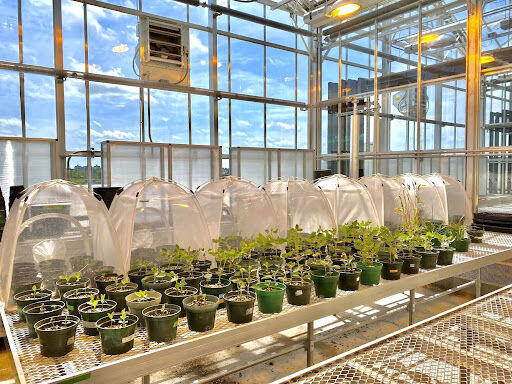Iowa Soybean Research Center funds several research projects
October 20, 2021
Recently, the Iowa Soybean Research Center was awarded funds to four different research projects. The Iowa Soybean Research Center conducts research year-round on how they can benefit all of Iowa, but farmers especially.
The Iowa Soybean Research Center, founded in 2014, is made up of Iowa State University, the Iowa Soybean Association and other partnering industry members. With its main office located in 2206 Agronomy Hall, the institution has other locations that are based out of multiple buildings on-campus that conduct research.
With it being so spread out, there is a wide range of areas where soybean research is conducted. These include Electrical & Computer Engineering, Agronomy, Ag & Biosystem Engineering, Entomology and Plant Pathology & Microbiology.
“Among all the six soybean centers within the United States, we are the only soybean center that is being funded for research,” Gregory Tylka, director of the Iowa Soybean Research Center, said.
To have this funding, the research must be proposed in August and go through the Iowa Soybean Association as they are the ones providing the funding. With soybeans being one of the most grown crops in Iowa, it is important to have the necessities to make this crop thrive. Having the funding allows for research to be conducted and farmers and companies receive the knowledge needed.
“Liang Dong, professor of electrical and computer engineering, and Steve Whitham, professor of plant pathology and microbiology, cross-pollinated to make sensors that wirelessly communicate with a computer that can detect when a plant is being infected by a disease or pathogen,” Tylka said.
Prashant Jha, associate professor of agronomy and extension weed specialist, has had their research funded by the Iowa Soybean Association as well.
“Currently in the state, we suffer from weeds being resistant to herbicides, especially the ones being overused with in the last 25 years,” Tylka said. “He is involved in a project with other weed scientists from Arkansas and Kansas working on non-chemical ways to control weeds. One way to do this is by developing an attachment that will be placed on the back of the combine to grind up the weed seeds, killing them before they get the chance to spread.”
On her own, Leonor Leandro, professor of plant pathology and microbiology is studying the most damaging soybean disease, called sudden death syndrome.
“One of the best ways to manage this is by breeding non-resistant plants with resistant plants,” Tylka said. “Leonor Leandro is identifying fields that are known to have plants with sudden death syndrome and planting different soybean strands in them to hopefully identify the problem based on dates they die.”
Most high-tech research happening on campus deals with the Enviratron, which is a building with growth chambers that can control the amount of CO2 content in the air.
“Steve Whitham, professor of plant pathology and microbiology, Lie Tang, professor of agricultural and biosystems engineering, and Danny Singh, professor of agronomy are studying how climate change is going to affect soybean growth and yield in the future,” Tylka said. “They use the Enviratron to mimic what future climate conditions would be and have robots that measure the soybean reactions.”
















